小学英语 英语故事(童话故事)The Puppet Showman 演木偶戏的人
木偶戏英语作文
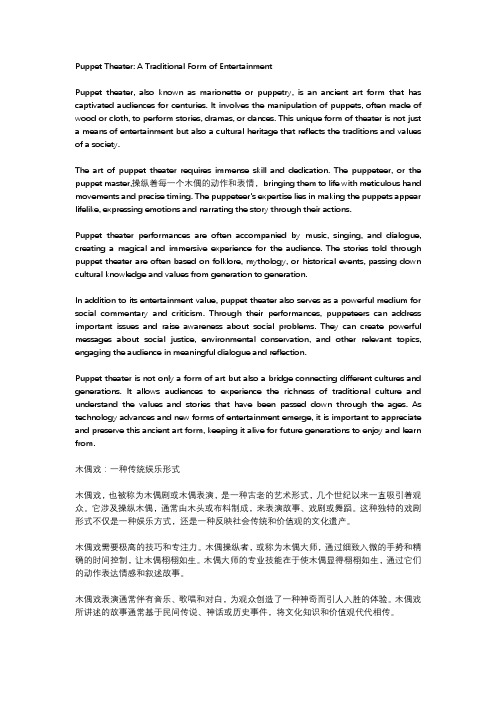
Puppet Theater: A Traditional Form of EntertainmentPuppet theater, also known as marionette or puppetry, is an ancient art form that has captivated audiences for centuries. It involves the manipulation of puppets, often made of wood or cloth, to perform stories, dramas, or dances. This unique form of theater is not just a means of entertainment but also a cultural heritage that reflects the traditions and values of a society.The art of puppet theater requires immense skill and dedication. The puppeteer, or the puppet master,操纵着每一个木偶的动作和表情,bringing them to life with meticulous hand movements and precise timing. The puppeteer's expertise lies in making the puppets appear lifelike, expressing emotions and narrating the story through their actions.Puppet theater performances are often accompanied by music, singing, and dialogue, creating a magical and immersive experience for the audience. The stories told through puppet theater are often based on folklore, mythology, or historical events, passing down cultural knowledge and values from generation to generation.In addition to its entertainment value, puppet theater also serves as a powerful medium for social commentary and criticism. Through their performances, puppeteers can address important issues and raise awareness about social problems. They can create powerful messages about social justice, environmental conservation, and other relevant topics, engaging the audience in meaningful dialogue and reflection.Puppet theater is not only a form of art but also a bridge connecting different cultures and generations. It allows audiences to experience the richness of traditional culture and understand the values and stories that have been passed down through the ages. As technology advances and new forms of entertainment emerge, it is important to appreciate and preserve this ancient art form, keeping it alive for future generations to enjoy and learn from.木偶戏:一种传统娱乐形式木偶戏,也被称为木偶剧或木偶表演,是一种古老的艺术形式,几个世纪以来一直吸引着观众。
英语作文传统文化木偶戏
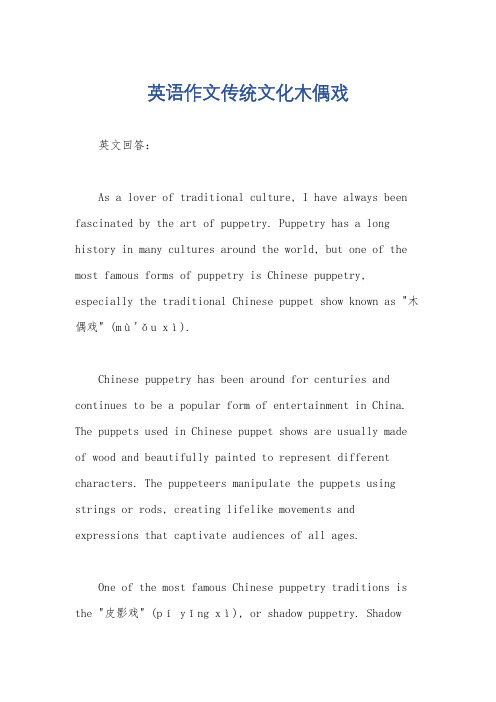
英语作文传统文化木偶戏英文回答:As a lover of traditional culture, I have always been fascinated by the art of puppetry. Puppetry has a long history in many cultures around the world, but one of the most famous forms of puppetry is Chinese puppetry, especially the traditional Chinese puppet show known as "木偶戏" (mù'ǒu xì).Chinese puppetry has been around for centuries and continues to be a popular form of entertainment in China. The puppets used in Chinese puppet shows are usually made of wood and beautifully painted to represent different characters. The puppeteers manipulate the puppets using strings or rods, creating lifelike movements and expressions that captivate audiences of all ages.One of the most famous Chinese puppetry traditions is the "皮影戏" (pí yǐng xì), or shad ow puppetry. Shadowpuppetry involves using intricately cut leather puppets to cast shadows on a screen, accompanied by music, singing,and storytelling. The stories told in Chinese puppet shows often draw from traditional folk tales, historical events,or moral lessons, making them not only entertaining butalso educational.I remember watching a Chinese puppet show when I was a child, and I was completely mesmerized by the skill of the puppeteers and the beauty of the puppets. The way the puppets moved and danced on the stage seemed almost magical, and I was transported to a different world filled with wonder and excitement.Chinese puppetry is not just a form of entertainment;it is also a valuable cultural heritage that should be preserved and passed down to future generations. Bylearning about and appreciating traditional art forms like puppetry, we can gain a deeper understanding of the rich history and culture of China.中文回答:作为一个传统文化的爱好者,我一直对木偶戏这门艺术深感着迷。
木偶戏英文作文

木偶戏英文作文English: Puppetry, also known as puppet theater, is a form of performance art that involves the manipulation of puppets to tell a story or convey a message. Dating back thousands of years, puppetry has been a popular form of entertainment in various cultures around the world. It combines elements of theater, storytelling, music, and visual arts to create a unique and engaging experience for audiences. Puppetry can involve a wide range of puppet types, from hand puppets and marionettes to shadow puppets and rod puppets, each requiring different techniques and skills to operate. The puppeteers, also known as puppeteers or manipulators, play a crucial role in bringing the puppets to life through movement, voice, and expression. Through the use of puppets, puppetry can explore complex themes, convey emotions, and engage with audiences of all ages.中文翻译: 木偶戏,也被称为木偶剧,是一种利用木偶来讲故事或传达信息的表演艺术形式。
木偶戏英文作文
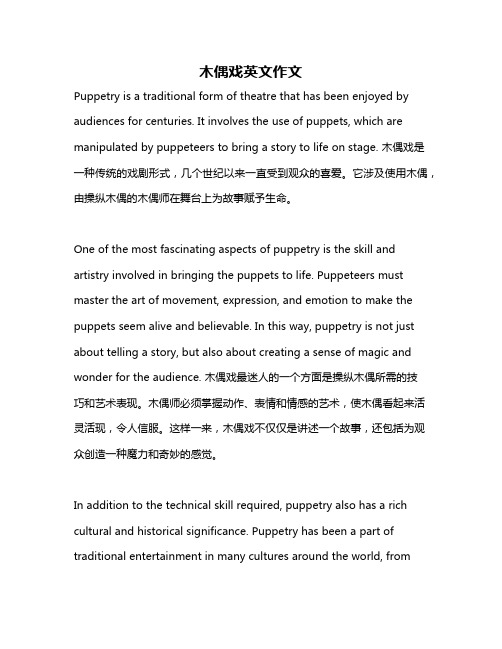
木偶戏英文作文Puppetry is a traditional form of theatre that has been enjoyed by audiences for centuries. It involves the use of puppets, which are manipulated by puppeteers to bring a story to life on stage. 木偶戏是一种传统的戏剧形式,几个世纪以来一直受到观众的喜爱。
它涉及使用木偶,由操纵木偶的木偶师在舞台上为故事赋予生命。
One of the most fascinating aspects of puppetry is the skill and artistry involved in bringing the puppets to life. Puppeteers must master the art of movement, expression, and emotion to make the puppets seem alive and believable. In this way, puppetry is not just about telling a story, but also about creating a sense of magic and wonder for the audience. 木偶戏最迷人的一个方面是操纵木偶所需的技巧和艺术表现。
木偶师必须掌握动作、表情和情感的艺术,使木偶看起来活灵活现,令人信服。
这样一来,木偶戏不仅仅是讲述一个故事,还包括为观众创造一种魔力和奇妙的感觉。
In addition to the technical skill required, puppetry also has a rich cultural and historical significance. Puppetry has been a part of traditional entertainment in many cultures around the world, fromEuropean marionettes to Asian shadow puppets. Each culture has its own unique style and tradition of puppetry, making it a fascinating window into the customs and beliefs of different societies. 除了需要的技术技巧之外,木偶戏也具有丰富的文化和历史意义。
木偶戏英语作文
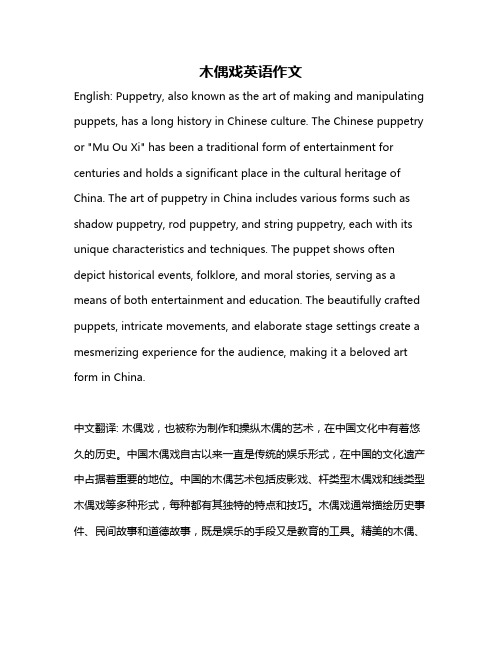
木偶戏英语作文English: Puppetry, also known as the art of making and manipulating puppets, has a long history in Chinese culture. The Chinese puppetry or "Mu Ou Xi" has been a traditional form of entertainment for centuries and holds a significant place in the cultural heritage of China. The art of puppetry in China includes various forms such as shadow puppetry, rod puppetry, and string puppetry, each with its unique characteristics and techniques. The puppet shows often depict historical events, folklore, and moral stories, serving as a means of both entertainment and education. The beautifully crafted puppets, intricate movements, and elaborate stage settings create a mesmerizing experience for the audience, making it a beloved art form in China.中文翻译: 木偶戏,也被称为制作和操纵木偶的艺术,在中国文化中有着悠久的历史。
中国木偶戏自古以来一直是传统的娱乐形式,在中国的文化遗产中占据着重要的地位。
安徒生童话故事第102篇:演木偶戏的人ThePuppet-ShowMan
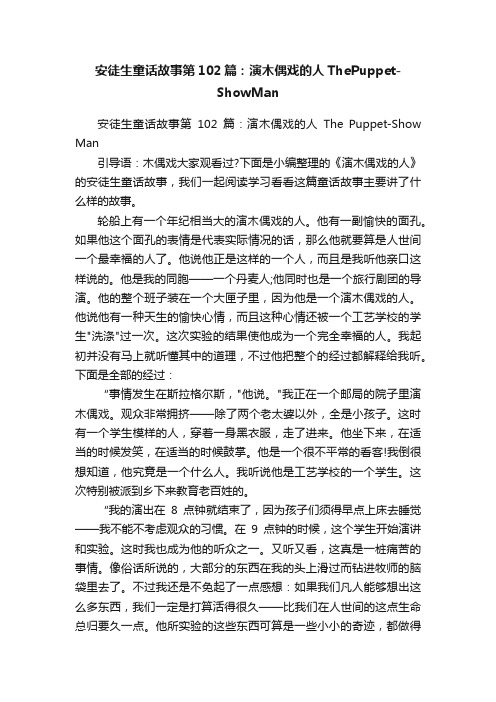
安徒生童话故事第102篇:演木偶戏的人ThePuppet-ShowMan安徒生童话故事第102篇:演木偶戏的人The Puppet-Show Man引导语:木偶戏大家观看过?下面是小编整理的《演木偶戏的人》的安徒生童话故事,我们一起阅读学习看看这篇童话故事主要讲了什么样的故事。
轮船上有一个年纪相当大的演木偶戏的人。
他有一副愉快的面孔。
如果他这个面孔的表情是代表实际情况的话,那么他就要算是人世间一个最幸福的人了。
他说他正是这样的一个人,而且是我听他亲口这样说的。
他是我的同胞——一个丹麦人;他同时也是一个旅行剧团的导演。
他的整个班子装在一个大匣子里,因为他是一个演木偶戏的人。
他说他有一种天生的愉快心情,而且这种心情还被一个工艺学校的学生"洗涤"过一次。
这次实验的结果使他成为一个完全幸福的人。
我起初并没有马上就听懂其中的道理,不过他把整个的经过都解释给我听。
下面是全部的经过:“事情发生在斯拉格尔斯,"他说。
"我正在一个邮局的院子里演木偶戏。
观众非常拥挤——除了两个老太婆以外,全是小孩子。
这时有一个学生模样的人,穿着一身黑衣服,走了进来。
他坐下来,在适当的时候发笑,在适当的时候鼓掌。
他是一个很不平常的看客!我倒很想知道,他究竟是一个什么人。
我听说他是工艺学校的一个学生。
这次特别被派到乡下来教育老百姓的。
“我的演出在8点钟就结束了,因为孩子们须得早点上床去睡觉——我不能不考虑观众的习惯。
在9点钟的时候,这个学生开始演讲和实验。
这时我也成为他的听众之一。
又听又看,这真是一桩痛苦的事情。
像俗话所说的,大部分的东西在我的头上滑过而钻进牧师的脑袋里去了。
不过我还是不免起了一点感想:如果我们凡人能够想出这么多东西,我们一定是打算活得很久——比我们在人世间的这点生命总归要久一点。
他所实验的这些东西可算是一些小小的奇迹,都做得恰到好处,非常自然。
像这样的一个工艺学校学生,在摩西和预言家的时代,一定可以成为国家的一个圣人①;但是假如在中世纪,他无疑地会被烧死②。
介绍木偶戏作文英语
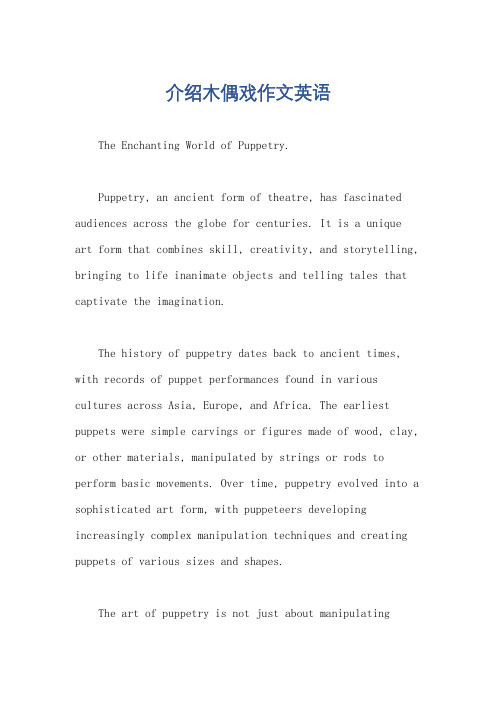
介绍木偶戏作文英语The Enchanting World of Puppetry.Puppetry, an ancient form of theatre, has fascinated audiences across the globe for centuries. It is a uniqueart form that combines skill, creativity, and storytelling, bringing to life inanimate objects and telling tales that captivate the imagination.The history of puppetry dates back to ancient times, with records of puppet performances found in various cultures across Asia, Europe, and Africa. The earliest puppets were simple carvings or figures made of wood, clay, or other materials, manipulated by strings or rods to perform basic movements. Over time, puppetry evolved into a sophisticated art form, with puppeteers developing increasingly complex manipulation techniques and creating puppets of various sizes and shapes.The art of puppetry is not just about manipulatingpuppets; it is also about storytelling. Puppet shows often feature traditional tales, myths, or legends that are passed down through generations. These stories are retold through the puppets, who come alive under the skilled hands of the puppeteer, performing actions, expressing emotions, and bringing the story to life.The puppets themselves are works of art, often crafted from a variety of materials such as wood, cloth, paper, or plastic. Each puppet is unique, reflecting the style and traditions of the puppeteer and the culture they come from. Some puppets are designed to be highly detailed and realistic, while others are more abstract and symbolic. Regardless of their appearance, puppets are powerful tools for storytelling, able to evoke a sense of wonder and imagination in the viewer.Puppetry requires a unique set of skills and talents. The puppeteer must have a keen sense of timing and coordination, as well as a strong imagination and storytelling ability. They must be able to manipulate the puppet with precision and finesse, while also voicing thecharacters and bringing them to life through expression and movement. This blend of skills makes puppetry a highly engaging and entertaining form of theatre.Puppetry has also been a powerful medium for social commentary and cultural expression. Through their puppet shows, artists have been able to comment on social issues, criticize authority, and tell stories that reflect the experiences and perspectives of marginalized groups. Puppetry has also been used as a teaching tool, helping children understand complex concepts and issues through the medium of storytelling.Today, puppetry continues to thrive and evolve. Puppet shows are still performed in many parts of the world, attracting audiences of all ages. Modern puppetry has also embraced new technologies and innovations, such as digital puppetry and augmented reality, to create even more immersive and interactive experiences for the viewer.In conclusion, puppetry is an enchanting art form that has captivated audiences for centuries. It is a uniqueblend of skill, creativity, and storytelling, that brings to life inanimate objects and tells tales that inspire the imagination. As we move into the future, puppetry continues to thrive and evolve, bringing joy and wonder to people across the globe.。
演木偶戏的人英语作文
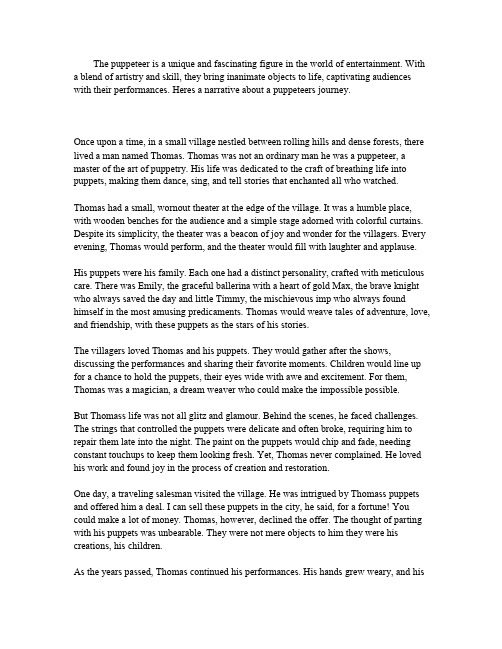
The puppeteer is a unique and fascinating figure in the world of entertainment. With a blend of artistry and skill, they bring inanimate objects to life, captivating audiences with their performances. Heres a narrative about a puppeteers journey.Once upon a time, in a small village nestled between rolling hills and dense forests, there lived a man named Thomas. Thomas was not an ordinary man he was a puppeteer, a master of the art of puppetry. His life was dedicated to the craft of breathing life into puppets, making them dance, sing, and tell stories that enchanted all who watched.Thomas had a small, wornout theater at the edge of the village. It was a humble place, with wooden benches for the audience and a simple stage adorned with colorful curtains. Despite its simplicity, the theater was a beacon of joy and wonder for the villagers. Every evening, Thomas would perform, and the theater would fill with laughter and applause.His puppets were his family. Each one had a distinct personality, crafted with meticulous care. There was Emily, the graceful ballerina with a heart of gold Max, the brave knight who always saved the day and little Timmy, the mischievous imp who always found himself in the most amusing predicaments. Thomas would weave tales of adventure, love, and friendship, with these puppets as the stars of his stories.The villagers loved Thomas and his puppets. They would gather after the shows, discussing the performances and sharing their favorite moments. Children would line up for a chance to hold the puppets, their eyes wide with awe and excitement. For them, Thomas was a magician, a dream weaver who could make the impossible possible.But Thomass life was not all glitz and glamour. Behind the scenes, he faced challenges. The strings that controlled the puppets were delicate and often broke, requiring him to repair them late into the night. The paint on the puppets would chip and fade, needing constant touchups to keep them looking fresh. Yet, Thomas never complained. He loved his work and found joy in the process of creation and restoration.One day, a traveling salesman visited the village. He was intrigued by Thomass puppets and offered him a deal. I can sell these puppets in the city, he said, for a fortune! You could make a lot of money. Thomas, however, declined the offer. The thought of parting with his puppets was unbearable. They were not mere objects to him they were his creations, his children.As the years passed, Thomas continued his performances. His hands grew weary, and hiseyesight began to fade, but his passion for puppetry never waned. He taught the village children the art of puppetry, passing on his knowledge and love for the craft. The village, in turn, supported him, helping to maintain the theater and ensuring that his performances could continue.Thomass life was a testament to the power of imagination and the magic of storytelling. He showed that with dedication and love, one could create something beautiful and meaningful. And as long as there were puppeteers like Thomas, the world would always have a touch of enchantment, a reminder that dreams can come alive with a flick of the wrist and a pull of the strings.。
- 1、下载文档前请自行甄别文档内容的完整性,平台不提供额外的编辑、内容补充、找答案等附加服务。
- 2、"仅部分预览"的文档,不可在线预览部分如存在完整性等问题,可反馈申请退款(可完整预览的文档不适用该条件!)。
- 3、如文档侵犯您的权益,请联系客服反馈,我们会尽快为您处理(人工客服工作时间:9:00-18:30)。
The Puppet Showman 演木偶戏的人On board the steamer was an elderly man with such a joyful face that if it didn't belie him he must have been the happiest person on earth. In fact, he said he was the happiest; I heard it from his own mouth. He was a Dane, a countryman of mine, and a traveling theatrical producer. His whole company was with him and lay in a large box, for he was the proprietor of a puppet show. He said that his natural cheerfulness had been enlightened by a Polytechnic student, and the experiment had left him completely happy. At first I didn't understand what he meant, but later he explained the whole thing to me, and here is the story."In the town of Slagelse," he said, "I gave a performance in the post-office courtyard before a brilliant audience, all juvenile except for two old matrons. Suddenly a person in black, looking like a student, entered the hall and sat down; he laughed at the right places and applauded appropriately. He was an unusual spectator. I was anxious to know who he was, and I learned that he was a student from the Polytechnic Institute of Copenhagen who had been sent out to teach the people in the provinces. My performance ended promptly at eight o'clock, for children must go to bed early, and a manager must consider the convenience of his public. At nine o'clock the student began his lecture and experiments, and now I was one of his spectators. It was all extraordinary to hear and see. Most of it went over my head and into the parson's, as one says, but it made me think that if we mortals can learn so much we must surely be intended to last longer than the little span we're here on earth. What he performed were miracles, and though only small ones, everything was done as easily as a foot fits into a stocking, as naturally as nature functions. In the days of Moses and the prophets such a man would have been counted among the wise men of the land; in the Middle Ages he would have been burned at the stake. I didn't sleep that whole night. And the next evening, when I gave another performance, and the student was again present, I was in an exuberantly good humor. I once heard from an actor that when he played the part of a lover he always thought of one particular lady in the audience; he played only to her and forgot the rest of the house. Now the Polytechnic student was my 'she,' my only spectator, for whom alone I performed."After the performance, when the puppets had taken their curtain calls, the Polytechnic student invited me into his room to have a glass of wine; he spoke of my plays, and I spoke of his science, and I think we were equally pleased. But I had the better of it, for there was much of what he did that he couldn't explain to me. For instance, a piece of iron that falls through a spiral becomes magnetic. Now why does that happen? The spirit enters it, but where does it come from? It is just as it is with the humans in our world, I think; our Lord lets them fall through the spiral line of time; the spirit enters them, and there then stands a Napoleon, a Luther, or some such person. 'The whole world is a series of miracles,' said the student, 'but we're so used to them that we call them everyday things.' And he continued talking and explaining until finally my skull seemed lifted from my brain, and I honestly confessed that if I weren't already an old fellow I would at onceattend the Polytechnic Institute and learn to examine the world more closely, even though I was one of the happiest of men." 'One of the happiest!' said the student, and seemed to be quite thoughtful about it. 'Are you really happy?' he asked me." 'Yes,' I said, 'I am happy. All the towns welcome me whenever I come with my company. But I do, to be sure, have one wish, which sometimes haunts me like a goblin- a nightmare that rides on my good nature. I should like to be a real theatrical manager, director of a troupe of real men and women!'" 'You wish your puppets would come to life; you wish they would become real actors,' he said, 'and you would be their director; and then would you be completely happy, you think?' He didn't believe it, but I believed it, and we talked back and forth about it, without coming any nearer a solution; still we clinked glasses together, and the wine was excellent. There must have been some magic in it, for otherwise the story would have been that I got drunk. That didn't happen, though; I kept my clear viewpoint. Somehow there was sunlight in the room, and it shone from the face of the Polytechnic student. It made me think of the old tales of the gods in their eternal youth, when they wandered on earth. I told him that, and he smiled. I could have sworn that he was one of the old gods in disguise, or at least that he belonged to their family! And he certainly must have been something of that sort, for my greatest wish was to be fulfilled; the puppets would come to life, and I would be the director of real people. We drank to that."He packed all my puppets into a wooden box, strapped it on my back, and then let me fall through a spiral. I can still hear how I tumbled; and then I was lying on the floor-this is positively true-and the whole company sprang from the box! The spirit had come upon all of them; all the puppets had become great artists-at least, so they said-and I was their director. Everything was ready for the first performance. But the whole company wanted to speak to me, and the public, too."The prima ballerina said that the 'house' was going to 'fall' if she didn't stand on one leg in the show; she was mistress of the whole company, and insisted on being treated as such. The lady who played the empress wanted to be treated as an empress off stage, or else she would get out of practice. The man who had only to deliver a letter made himself as important as the leading man, for the little parts were just as important as the big ones, and all were of equal consequence in making up an artistic whole, he said. The hero would play only parts composed of nothing but exit lines, because those brought him the applause. The prima donna would only play act in a red light, for that suited her best; she refused to appear in a blue one. They were like a troupe of flies in a bottle, and I was in the middle of the bottle with them, for I was the director. My breath stopped, and my head was dizzy; I was as miserable as a man can be. It was quite a new kind of people among whom I found myself now. I only wished I had them all back in their box and that I had never been a director at all. I told them straight out that they were all nothing but puppets-and so they killed me!"I found myself lying on my bed in my room; how I got there, or how I got away from the Polytechnic student, he may know-I don't. The moon shone in on the floor wherethe box lay overturned, and all the dolls, great and small, were scattered about in confusion; but I wasn't idle. I jumped out of bed and popped them all back into the box, some on their heads and some on their feet; then I slammed down the lid, and seated myself on the box. It was a picture worth painting! Can't you just see it? I can! 'Now you'll just have to stay in there,' I said. 'And I'll never again wish that you have flesh and blood!' I was in such a relieved frame of mind, I was the happiest of men. The Polytechnic student had entirely purified me. I sat there in a state of utter contentment and fell asleep on the box."The next morning-it was really noon, for I slept wonderfully late that day-I was still sitting there, lighthearted, and conscious that my one former wish had been foolish. I asked for the Polytechnic student, but he was gone, like the gods of Greece and Rome; and since that time I have been the happiest of men. I am a happy director; my company never grumbles, or my public either-they're amused to their hearts' content. I can put my plays together just as I like, taking out of other plays anything that pleases me, and no one is annoyed at it. Plays that nowadays are disdained in the big theaters, but that the public ran to see, and wept over, thirty years ago-those plays I now put on. I perform them for the little ones, and the little ones weep just as Papa and Mamma did. I give them Johanne Montsaucon and Dyveke, but in abbreviated versions, for the youngsters don't want long-winded love stories; what they want is something sad but short."I have traveled through Denmark from one end to the other; I know everyone there, and everyone knows me. Now I'm on my way to Sweden, and if I'm successful there and make good money, I'll be a man of Scandinavia; otherwise I won't. I tell you this because you are my countryman."And I, as his countryman, in turn naturally tell it - just for the sake of telling it.。
